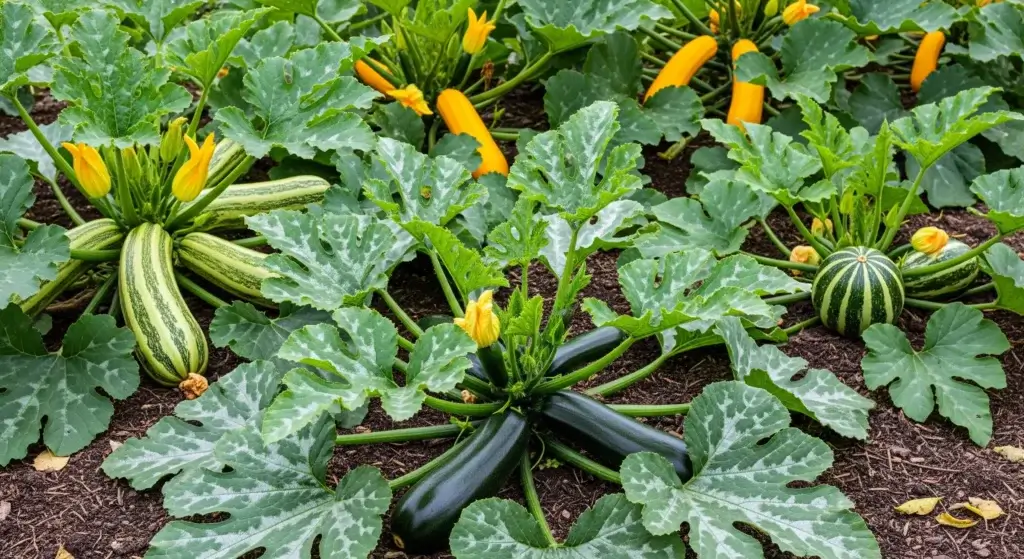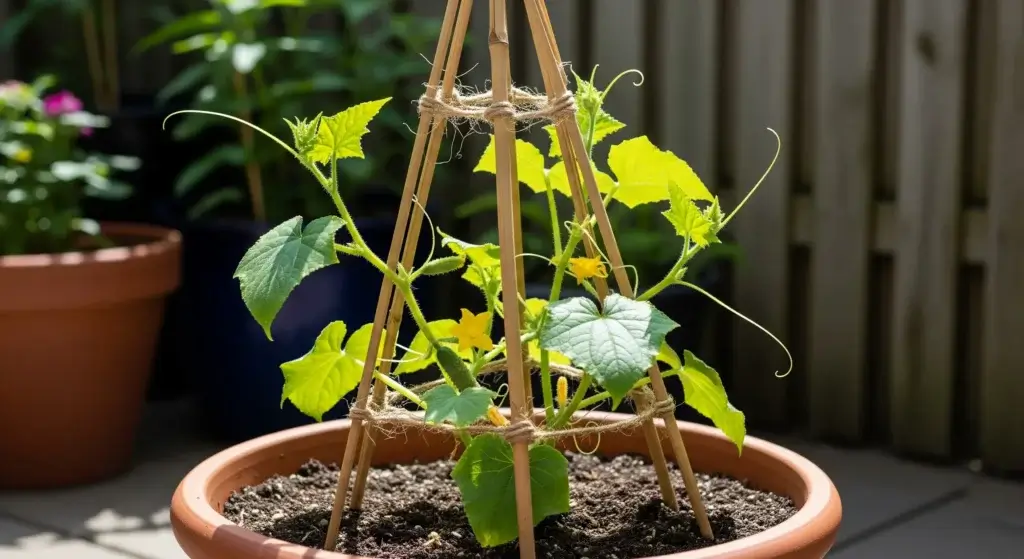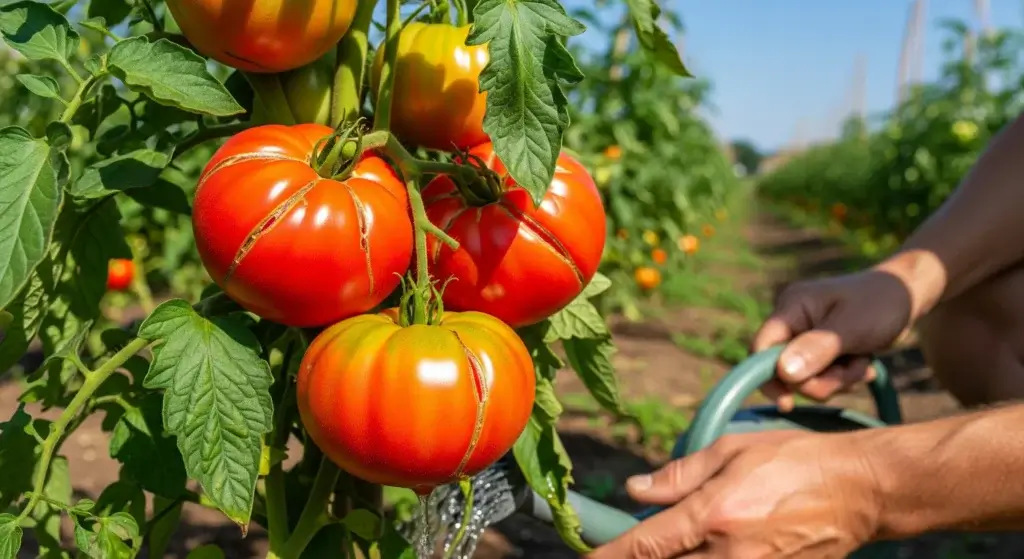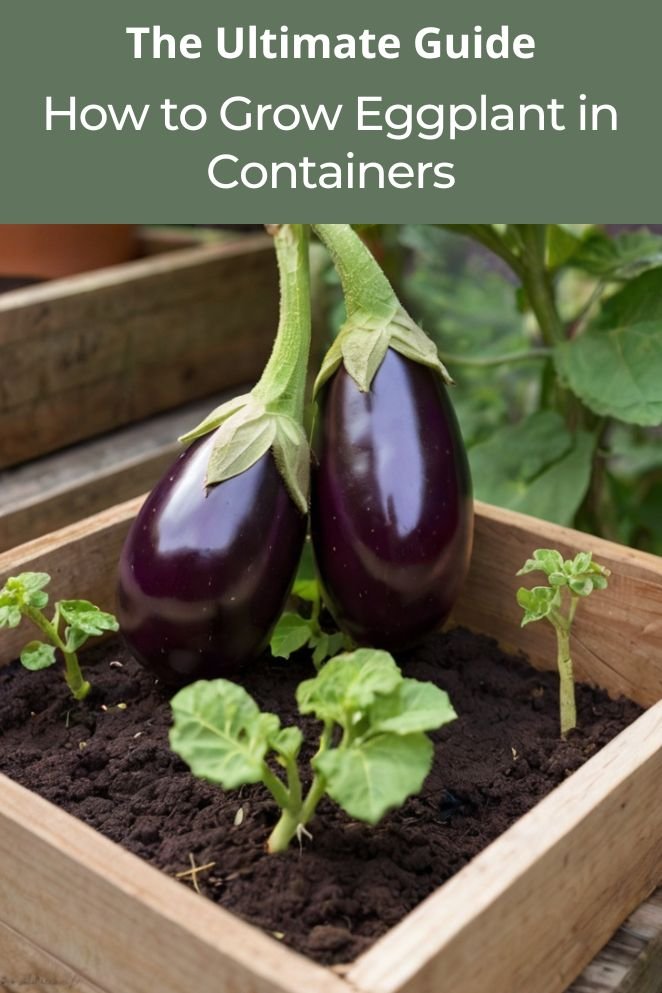
Eggplants are a delicious and versatile vegetable that can be grown successfully in containers, even if you don’t have a lot of space.
Container gardening offers the convenience of mobility, better control over soil conditions, and easier pest management.
In this guide, we’ll walk you through everything you need to know about growing eggplants in containers, from choosing the right pot to harvesting those beautiful fruits.
Whether you’re a seasoned gardener or just getting started, these tips will help you enjoy a bountiful eggplant harvest.
Benefits of Growing Eggplant in Containers
Growing eggplants in containers offers several advantages:
Space-saving
Containers are perfect if you don’t have a lot of space.
Whether you have a tiny backyard, a balcony, or even just a small patio, you can still grow eggplants.
Containers let you make the most of whatever space you have.
- Read also: The Ultimate Guide to Growing Lettuce in Containers
- Read also: Step by Step Guide: How to Grow Cherry Tomatoes in a Container
Mobility
One of the biggest advantages of container gardening is mobility.
You can easily move your containers to catch the best sunlight or to protect your plants from extreme weather.
This flexibility helps your eggplants get the optimal conditions they need.
Better control over soil and pests
When you grow eggplants in containers, you have complete control over the soil mix.
This can be particularly beneficial in avoiding soil-borne diseases and pests.
By choosing a high-quality soil and managing it yourself, you create a healthier environment for your plants.
Water management
Containers make it easier to manage watering.
You can adjust how much or how little water your eggplants get, reducing the risk of problems like waterlogging or drought stress.
This control helps keep your plants healthy and thriving.
According to a study by the University of California’s Division of Agriculture, container gardening can boost productivity for certain crops by allowing you to better control growing conditions.
This means your eggplants might grow more effectively in containers compared to traditional garden beds.
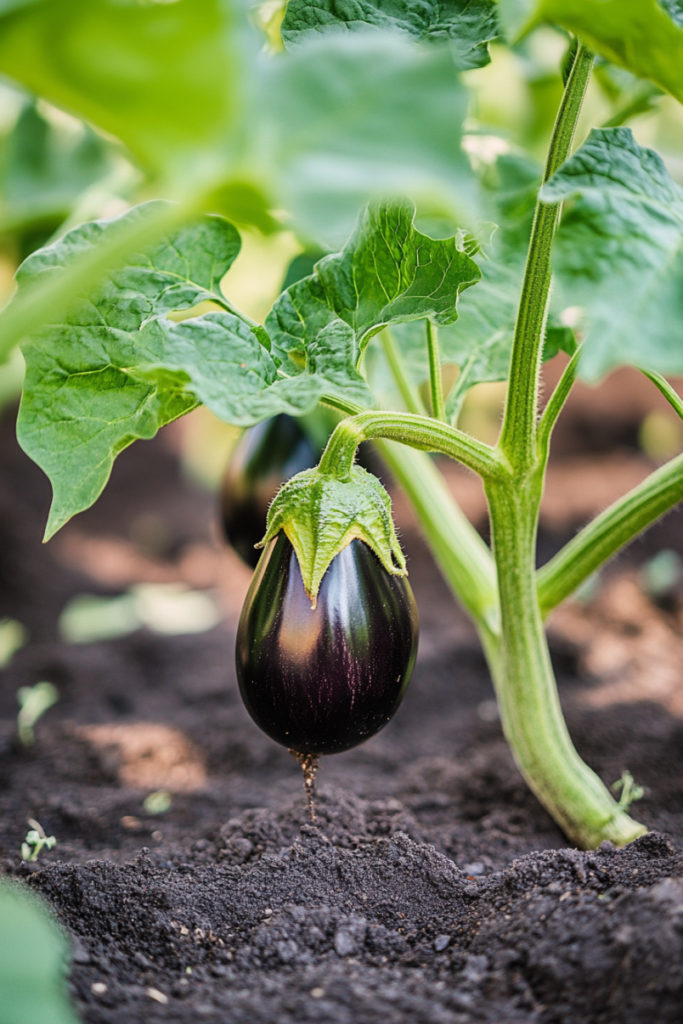
Selecting the Right Container
Choosing the right container is crucial for growing healthy eggplant plants.
Here’s what to look for:
Size
Eggplants need space to grow, so choose a container that’s at least 12-14 inches in diameter and depth.
Larger containers support better root development and give the plant ample room to grow.
A bigger container can also help with overall plant health and yield.
Material
Containers come in various materials like plastic, ceramic, wood, and fabric.
Each has its pros:
- Plastic pots are lightweight and retain moisture well.
- Fabric pots offer excellent aeration for the roots, which is beneficial for healthy growth. Just make sure the material allows for proper drainage to prevent water from sitting at the bottom.
Drainage holes
Proper drainage is crucial for preventing root rot.
Ensure your container has several drainage holes.
This allows excess water to escape and keeps the soil from becoming waterlogged, which can harm your eggplants.
A well-drained container with a diameter of at least 14 inches is ideal for growing eggplants.
Studies show that containers with good drainage and sufficient depth can increase plant yield by up to 25%.
Preparing the Container and Soil
The soil you choose and how you prepare your container can make a big difference in how well your eggplants grow.
Here’s a step-by-step guide to get you started:
Choose the right soil mix
Eggplants need soil that drains well and is rich in nutrients.
Instead of using garden soil, which can be too dense for containers, opt for a high-quality potting mix.
Potting mixes are designed to be light and well-draining, making them perfect for container gardening.
For added fertility, mix in some compost or other organic matter.
Amend the soil
To give your eggplants a nutrient boost, add some organic amendments:
- Aged compost: Adds essential nutrients and improves soil structure.
- Bone meal: Provides phosphorus, which helps with root development and flowering.
- Blood meal: Adds nitrogen, which supports lush, green growth.
You can also mix in a balanced fertilizer with a 10-10-10 N-P-K ratio.
This ensures that the soil has a good mix of nitrogen (for leafy growth), phosphorus (for root and flower development), and potassium (for overall plant health).
Filling the container
When you fill your container with the soil mix, leave about 1-2 inches of space at the top.
This gap is important for watering—so water doesn’t spill over the edges.
Ensure the soil is evenly moist before planting to help your seedlings settle in better.
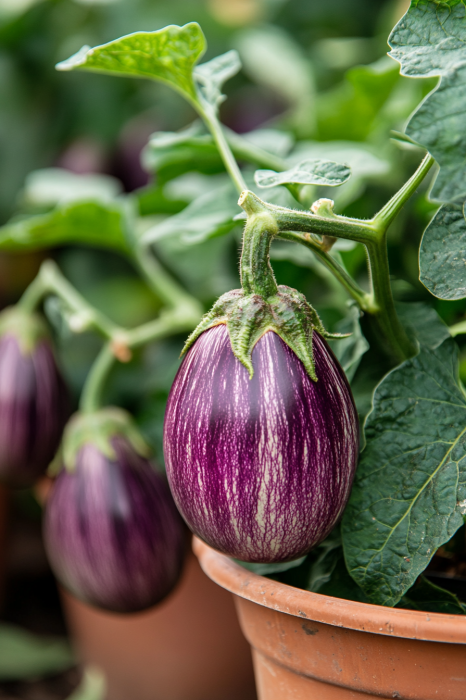
Planting Eggplant Seedlings
Once your container is ready, it’s time to plant your eggplant seedlings.
Here’s how:
Timing
Eggplants love warm weather. Wait until all danger of frost has passed and the temperatures are consistently above 70°F (21°C) before planting.
This ensures that your seedlings will thrive in the warm conditions they prefer.
Spacing
Depending on the size of your container, you can grow one or two eggplants per pot.
If you’re planting more than one, make sure to space them at least 18-24 inches apart.
This spacing allows for good air circulation, which helps prevent diseases and ensures that each plant gets enough sunlight.
Planting depth
Dig a hole in the soil that’s a bit deeper than the seedling’s root ball.
Place the seedling in the hole and gently fill it with soil, pressing lightly to secure the plant.
Make sure the top of the root ball is level with the soil surface to prevent water from pooling around the stem.
Providing Adequate Sunlight and Water
Eggplants are sun-loving plants and require plenty of warmth and light to grow well in containers.
Sunlight
Eggplants are sun-loving plants.
They need plenty of direct sunlight to grow well.
Aim for at least 6-8 hours of direct sunlight each day.
If you live in a cooler climate, or if your sunlight is limited, you might need to move your containers to catch as much sun as possible throughout the day.
Placing your pots in a sunny spot helps maximize light exposure and promotes healthy plant growth.
Watering
Consistent watering is crucial for eggplants, especially since soil in containers can dry out faster than in garden beds.
Here’s how to manage watering effectively:
- Watering deeply: Check the soil by feeling the top inch. If it feels dry, it’s time to water. When you water, do so deeply to ensure the roots get enough moisture.
- Avoiding overwatering: Be careful not to overwater, as soggy soil can lead to root rot. Ensure your container has good drainage.
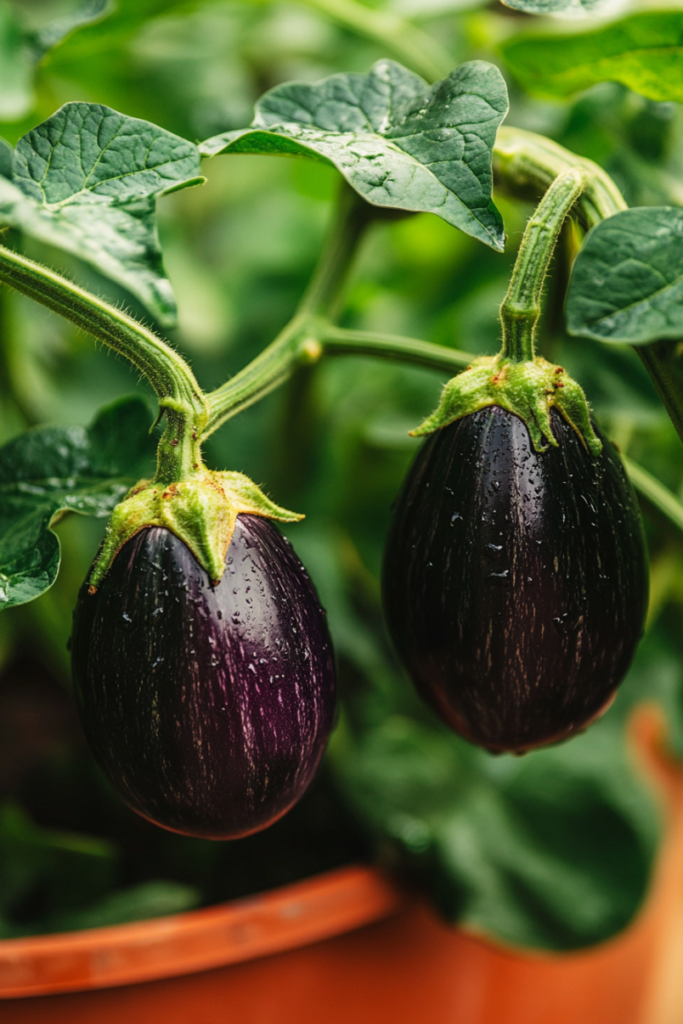
Fertilizing Eggplant Plants
Proper fertilization helps your eggplants grow strong and produce plenty of fruit.
Here’s how to manage it:
Initial fertilization
When you plant your eggplant seedlings, apply a balanced, slow-release fertilizer.
This gives your plants a good start by providing essential nutrients right from the beginning.
Regular feeding
As your eggplants begin to flower, switch to a fertilizer that’s higher in phosphorus and potassium, such as a 5-10-10 formula.
Phosphorus supports flower and fruit development, while potassium promotes overall plant health.
Regular feeding helps ensure your plants grow well and produce lots of fruit.
Frequency
Feed your eggplants every 3-4 weeks during the growing season.
This consistent feeding schedule helps maintain nutrient levels and supports healthy plant growth.
A study published in the “Journal of Plant Nutrition” found that eggplants that were regularly fertilized showed a significant increase in both yield and fruit size compared to those that weren’t fertilized.
This highlights the importance of regular, proper fertilization for achieving the best results.
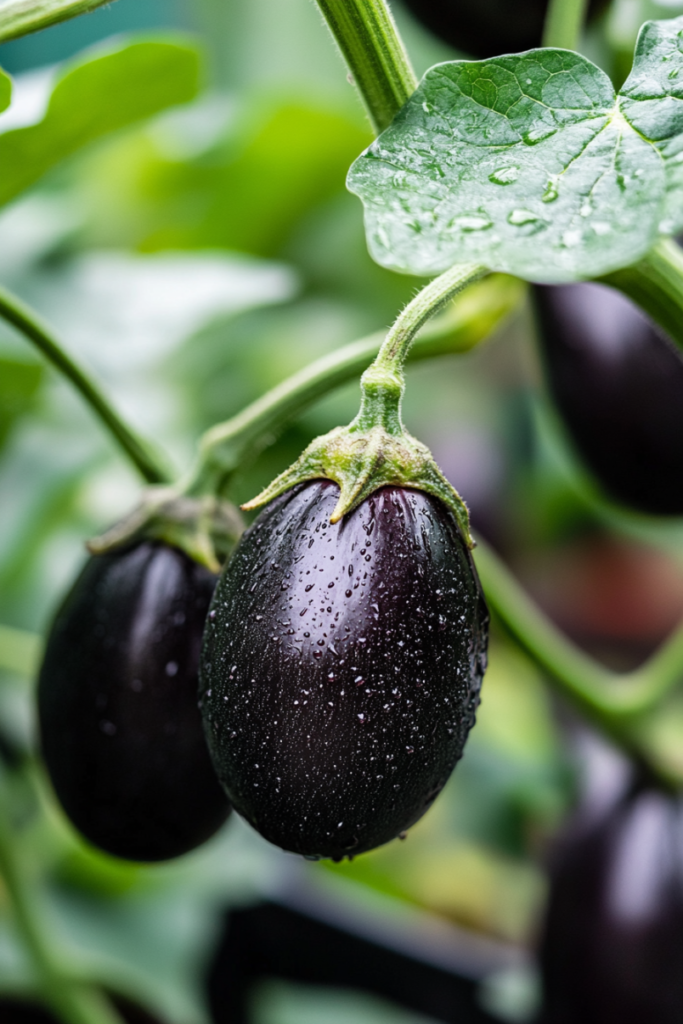
- Read also: Potted Perfection: Tips on Growing Broccoli in Containers
- Read also: Space-Saving Success: Tips for Growing Cabbage in Containers
Final Thoughts
Growing eggplants in containers is a rewarding experience that can yield delicious and healthy vegetables right at home.
By selecting the right container, preparing the soil, providing adequate sunlight and water, and fertilizing your plants regularly, you can enjoy a productive eggplant harvest, even in limited space.
Container gardening offers flexibility and control, making it an excellent option for gardeners of all skill levels.
FAQs
Eggplants need enough space for their roots to grow. A container that’s too small can stunt growth and reduce fruit production. Stick with a pot that’s at least 12-14 inches deep and wide.
Water deeply once the top inch of soil feels dry. In hot weather, you may need to water daily, but be cautious not to overwater.
While it’s possible, eggplants require a lot of sunlight—6-8 hours of direct sunlight daily. If growing indoors, use grow lights to supplement natural light.
From transplanting to harvest, eggplants usually take about 70-85 days to mature, depending on the variety.

